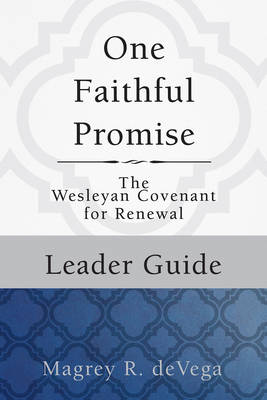
- Afhalen na 1 uur in een winkel met voorraad
- Gratis thuislevering in België vanaf € 30
- Ruim aanbod met 7 miljoen producten
- Afhalen na 1 uur in een winkel met voorraad
- Gratis thuislevering in België vanaf € 30
- Ruim aanbod met 7 miljoen producten
Zoeken
One Faithful Promise: Leader Guide
The Wesleyan Covenant for Renewal
Magrey Devega
Paperback | Engels
€ 12,95
+ 25 punten
Omschrijving
By makingi Three Smple Rules and Five Marks of a Methodist accessible for a current United Methodist and Wesleyan audience, Abingdon Press has reintroduced Wesley's formative identity and boosted our way of Christian living in thousands of congregations. The next most important document that Wesley delivered to the rapidly expanding societies and congregations was The Wesley Covenant Prayer and Renewal Service from 1755, which are crucial to Methodist identity. This service, a liturgical event in 1755, was preceded by several mornings of teaching from John Wesley about "the means of increasing serious religion." Charles Wesley also wrote a hymn supporting the prayer - "Come, Let Us Use the Grace Divine." Over the millennia since 1755, many Methodists have used this liturgy on New Year's Eve - the Watch Night Service - as a service of renewal of the individual's covenant with God for the coming year. More recently many churches have found other opportunities to provide this opportunity for the congregation. Wesley's covenant renewal can function now as an accessible church-wide campaign that culminates in the liturgical affirmation and faithful promise to love God and neighbor faithfully. The campaign could be: 1) Used during Advent and culminate on New Year's Eve with the Covenant prayer committed to memory and resolve. 2) Used from mid-September, with emphasis on homecoming and harvest, and culminated with the liturgical event on All Saint's Day. 3) Used prior to Lent and culminate on Ash Wednesday, or 4) Used during Lent and culminate on during holy week (read prior to the passion of Jesus).
Specificaties
Betrokkenen
- Auteur(s):
- Uitgeverij:
Inhoud
- Aantal bladzijden:
- 46
- Taal:
- Engels
Eigenschappen
- Productcode (EAN):
- 9781501824968
- Verschijningsdatum:
- 6/09/2016
- Uitvoering:
- Paperback
- Formaat:
- Trade paperback (VS)
- Afmetingen:
- 147 mm x 224 mm
- Gewicht:
- 68 g

Alleen bij Standaard Boekhandel
+ 25 punten op je klantenkaart van Standaard Boekhandel
Beoordelingen
We publiceren alleen reviews die voldoen aan de voorwaarden voor reviews. Bekijk onze voorwaarden voor reviews.











